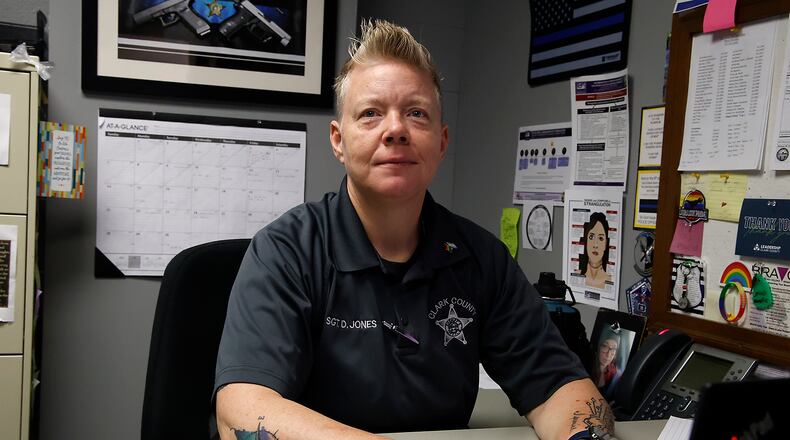“Many survivors connect with law enforcement and seek response from the justice system. Many do not and are seeking a safe new beginning,” said executive director Laura Baxter. “Project Woman approaches each case along side of the victim and helps them achieve the outcomes they are hoping for toward that new beginning.”
Baxter said most survivors are not willing to participate with law enforcement because they don’t know how to navigate the criminal justice system, and Project Woman advocates never talk victims into participating with the justice system, but only support and educate them to explain the justice system, what’s happening, and what comes next.
Credit: Bill Lackey
Credit: Bill Lackey
Lauren Dennis, advocacy services coordinator, works to collaborate with community partners serving survivors of gender-based violence, including intimate partner violence, sexual assault, stalking and human trafficking. She supervises a team of eight people, including six advocates, one part-time on-call advocate, and the crisis line and intake specialist.
Dennis said gender-based violence is an epidemic, and the goal is to help survivors end that violence through advocacy. She said whether a survivor chooses to participate in the criminal justice system or not, Project Woman has many options for helping them, including safety planning, protection orders, housing and relocation options, legal resources, medical and mental health partners, treatment for addiction, and linking to other resources that would help with the complex issues that arise.
“The most important part of working with survivors is meeting survivors where they are, which includes not forcing them to leave or to participate in a criminal case that can potentially cause further harm or detriment. By meeting the survivor where they are, we can facilitate safety in a difficult time without judgment,” she said.
Baxter added some data from the National Coalition Against Domestic Violence and the National Network to End Domestic Violence suggests the victim is frequently unwilling to contact law enforcement, because of the fear of retaliation, which she said is consistent with survivor stories directly shared with Project Woman staff.
Baxter recalls a story of one survivor who was at a scene yelling loudly at officers, telling them to leave after they arrived.
“In talking with me, she shared that she had to do that because, ‘When he comes home, I don’t want him blaming me and taking it out on me.’ She was afraid, and rightfully so. Retaliatory abuse is a consistent part of survivor stories and one of the biggest reasons that law enforcement is not called,” she said.
Dennis said Project Woman coordinates well with both prosecutors’ offices in Clark County to make sure the survivor and their rights and protections under VAWA are at the forefront. She said they have grown to a point where law enforcement understands confidentiality and they give space for advocates on-scene to accommodate those confidentiality requirements while meeting with survivors.
“When the criminal justice system is involved, advocates work to help survivors understand the systems and how to effectively use their voices to ultimately get help,” she said.
Project Woman also works with the Intimate Partner Violence Unit (IPVU) of the Clark County Sheriff’s Office. The office was previously awarded a grant to develop a trauma-informed victim-centered response to gender-based violence crimes, and with the grant, developed the IPVU, said Denise Jones, who leads the IPVU. While receiving specialized training and education about gender-based violence crimes, they developed a relationship with Project Woman.
“Prior to the development of this unit, we had no real relationship with our shelter and advocacy services. We now work with PW on a daily basis and have cultivated a strong partnership to better serve victims and survivors in our community,” Jones said. “Working with community-based advocacy provides confidential support to victims to better facilitate victim safety.”
The IPVU is responsible for all intimate partner violence calls for service the agency is dispatched to, they follow up with those calls, do follow-up interviews and refer to services. They also take cases in the county that are gender-based violence calls that may come in from the prosecutor’s office, advocacy groups or by any other referral points that are for domestic violence, strangulation, stalking and protection order violations.
The unit also partners with the Springfield Police Division, Clark County Prosecutor’s Office Victim Witness, Clark County Municipal Court, and has monthly high-risk team meetings.
“We hope moving forward to continue to grow our program and potentially move towards a family justice center that would bring all parties under the same roof at the same location to reduce the requirement of victim/survivors to travel to several locations to receive services,” Jones said.
Dennis said they’re always looking for up-to-date knowledge on gender-based violence and are available for anyone seeking services or willing to collaborate with trauma-informed partners.
“There are many reasons survivors have a difficult time leaving an abusive situation, or why they would choose to not report to law enforcement,” she said. “Advocates are a great resource and provide options for folks leaving abuse.”
Jones said if you or anyone you know is experiencing gender-based violence, reach out to your local advocacy programs.
“We understand the barriers to reporting and going through the criminal justice system, but advocates are here to help and support you regardless of your involvement with law enforcement,” she said.
Project Woman offers services and programs such as a 24/7 crisis line at 1-800-634-9893; emergency shelter; victim advocacy including safety planning, civil protection order assistance, court accompaniment, hospital response, crime victim compensation assistance, information and referral; transitional and supportive housing; behavioral health case management; community advocacy and education including awareness, prevention education for students, and community trainings for community partners, law enforcement and concerned citizens.
For more information, call 937-328-5308, email projectwoman@projectwomanohio.org or visit www.projectwomanohio.org.
About the Author


